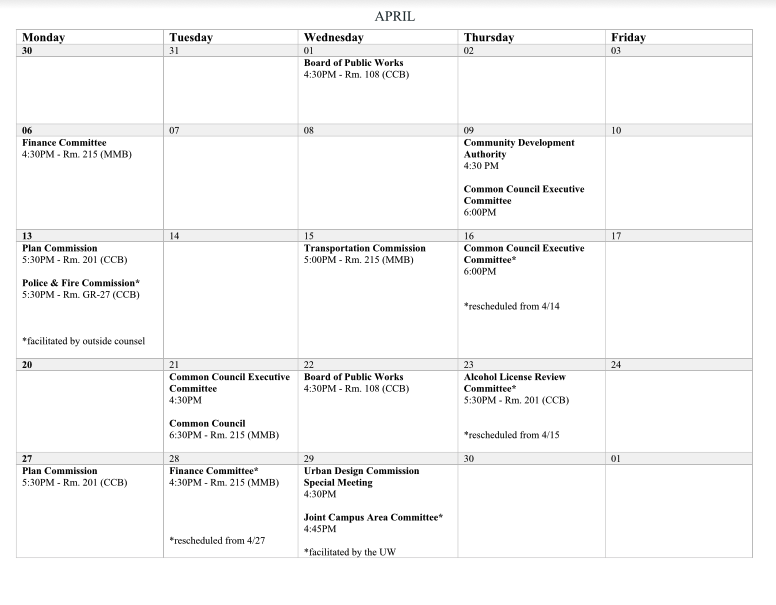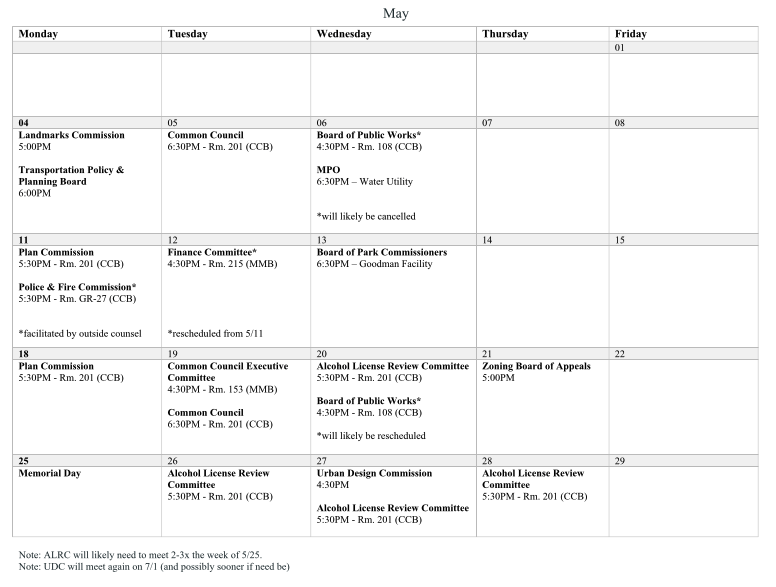The Common Council Executive Committee met on Thursday to discuss. They never voted on anything, so it’s unclear what is happening next, but here’s the latest information.
Here’s the agenda with the links from their Thursday meeting.
You can watch the meeting here – tho, I’m not sure you will learn much meaningful from the discussion as there didn’t seem to be any conclusions.
CURRENT MEETING CALENDAR
April – May 2020 Committee Meetings 4-15-2020 

WHICH COMMITTEES DEEMED ESSENTIAL TO MEET
I’m unclear who made this spreadsheet and I feel like there are some gross inaccuracies in the description of what committees do, but here’s the list of
- Tier One (already meeting)
- Tier Two (recovery priority area and/or statutory responsibilities)
- Tier Three (others)
In orange is the recovery priority assignments of the author of this document.
Tier One – Already Meeting
Alcohol License Review Committee
Board of Park Commissioners
Board of Public Works
Common Council
Common Council Executive Committee
Community Development Authority – Housing
Finance Committee – Budget
Joint Campus Area Committee
Landmarks Commission
Madison Area Transportation Planing Board (MPO) – Transportation
Plan Commission
Police and Fire Commission
Transportation Commission – Transportation
Urban Design Commission
Tier Two – Going to Start Meeting on Recovery Efforts
Community Development Block Grant Committee – Community/Non-Profit Support/Housing
Community Services Committee – Community/Non-Profit Support/Housing
Economic Development Committee – Small Business
Housing Strategy Committee – Housing
Landlord and Tenant Issues Committee – Housing
Madison Food Policy Council – Food Access
Transportation Policy and Planning Board – Transportation
Complete Count Committee – Budget
Room Tax Commission – Budget
Tier Three – Still non-essential, can’t meet
Note: All the designated public health committees are not meeting? Also note, nothing about racial equity or equal opportunities is a priority area. In red are some glaring errors. I added my own category Equity, because we need to be thinking about equity in our recovery efforts. I also added the Government Cooperation committees, because working together is more important now than ever. Also, Plan is for planning efforts are going to be critical to recovery. I also think that if the Aging Committee is public health, many others are as well, but I didn’t add those in, as there are elements of so many that could be considered public health. Also, I see them, but I left their typos.
Ad Hoc Landmarks Ordinance Review Committee
Administrative Review Board
Affirmative Action Commission – Equity
Bayview Foundation Board – Housing
Board of Health for Madison and Dane County – Public Health
Board of Review
Budget Committee- Board of Health for Madison and Dane County – Public Health
Building Code, Fire Code, Conveyance Code and Licensing Appeals Board
Capital Area Regional Planning Commission – Plan
CDA Housing Operations Subcommittee – Housing Equity
City County Homeless Issues Committee – Housing Equity, Public Health
City County Liaison Committee – Government Cooperation
Committee on Aging – Public Health Equity
Committee on Employee Relations – Unemployment
Community Development Division Conference Committee – Community/Non-Profit Support/Housing
Deferred Compensation Committee
Digital Technology Committee – Equity
Disability Rights Coalition- Equity
Downtown Coordinating Committee – Small Business
Early Childhood Care and Education Committee – Unemployment Community/Non-Profit Support, Equity
Education Committee – Government Cooperation, Equity
Emergency Management Planning Staff Team – Public Health
Equal Opportunities Commission – Unemployment, Housing, Equity
Erlanger, Jeffrey Clay, Civility in Public Discourse Award Committee
Ethics Board – Ahem . . . .
Executive Committee- Board of Health for Madison and Dane County – Public Health
Facilities Programs and Fees Subcommittee (Parks)
Golf Subcommittee
Habitat Stewardship Subcommittee (Parks)
Historic Preservation Plan Advisory Committee
Ho-Chunk Nation/City of Madison Joint Planning Committee Government Cooperation
Humanitarian Award Commission, Reverend Dr MLK Jr
Integrated Pest Management Policy Review Task Force – Public Health
Lakes and Watershed Commission (Dane County) – Public Health
Madison Arts Commisssion
Madison Cultural Ars District Board
Madison Housing Authority – Housing
Madison Public Library Board – Equity
Madison’s Central Business Improvement District (BID) – Small Business
Monona Terrace Booking Event Assistance Advisory Committee
Monona Terrace Community and Convention Center Board
Parks Long Range Planning Subcommittee
Personnel Board
President’s Work Group to Develop City-Wide Surveillance Equipment and Data Management
President’s Work Group to Review APM Applicable to Alders
President’s Work Group to Review Council Communication Tools and Processes
Public Market Development Committee
Public Safety Review Committee – Public Health, Budget, Equity
Sensitive Crimes Commission (Dane County) Equity
Sister City Collaboration Committee
Solid Waste Advisory Committee
Specialized Transporation Commission (Dane County) – Transportation
Street Use Staff Commission Small Business, Community/Non-profit Support
Sustainable Madison Committee
Task Force on Municipal Golf in Madison Parks
TIF Review Board
Truman Olson Selection Committee
Urban Forestry Task Force
Vending Oversight Committee – Small Business
Warner Park Community Recreation Center Advisory Subcommittee
Water Utility Board – Budget, Equity
Zoning Board of Appeals
Zoo Commission-Henry Vilas
COMMON COUNCIL WANTS TO CREATE MORE COMMITTEES?
I don’t really understand this, but the proposal was to create alder committee with a few alders on them, then in invite chairs of the committees to participate in the meetings. Here’s the proposal. Apparently the committees would be focused on recovery and this would be as follows
- Committees would not be permanent, but designed to address COVID-19 recovery efforts, including policy
- Committee membership would be comprised of Alders, but members of related existing Boards, Committees and Commissions would be welcome to participate as non-voting members
- All meetings of the committees would be open to the public
- Committees would be focused on mitigating long term effects of COVID-19 on our community
- Alders would work together to determine tasks that 1-2 Alders could work on and report back results to committee; Committees are not intended to just create work for City staff
- Work would include:
- researching available resources in recently passed legislation both by the state and federal government
- learning from previous responses locally and nationally to economic downturns
- learning from COVID-19 recovery efforts in other cities
- determining possible changes in our local ordinances to aid individuals and businesses in recovery
- working with the community to determine what additional resources are needed from the state and federal government for these efforts
These are the groups they would create and the focus areas they would work on, again there are a few glaring errors in red:
FOOD
Related Committee(s):
- MADISON FOOD POLICY COUNCIL (23 members)
- PUBLIC MARKET DEVELOPMENT COMMITTEE (14 members)
- VENDING OVERSIGHT COMMITTEE (10 members)
- COMMUNITY DEVELOPMENT BLOCK GRANT COMMISSION
- COMMUNITY SERVICES
Goals:
- Addressing long term food insecurity
- Researching and identify state and federal programs
- Look at previous local responses around the country
- Interact with local entities, and state/federal on needs to sustain food programs for more than just response period
- Farmer Marketso Access to surplus
- Continue access to local food while traditional open public markets might not be open and running
- Community Gardens Terrace Expansion and Policy
- Look at private partnerships
- Example:Metcalfe’s gift card program
HOUSING
Related Committee(s):
- COMMUNITY DEVELOPMENT AUTHORITY (7 members)
- CITY-COUNTY HOMELESS ISSUES COMMITTEE (13 members)
- COMMUNITY DEVELOPMENT BLOCK GRANT COMMITTEE (11 members)
- HOUSING STRATEGY COMMITTEE (9 members)
- LANDLORD AND TENANT ISSUES COMMITTEE (8 members)
- LANDMARKS COMMISSION (7 members)
- PLAN COMMISSION (12 members)
- URBAN DESIGN COMMISSION (10 members)
- EQUAL OPPORTUNITIES COMMISSION
- PUBLIC SAFETY REVIEW COMMITTEE (police have a huge impact on housing and homeless persons)
Goals:
- Homeless Population
- Eviction Prevention / Rental Assistance
- Mortgage Assistance / Foreclosure Prevention
- Landlord assistance
- Affordable Housing
UNEMPLOYMENT
Related Committee(s):
- ECONOMIC DEVELOPMENT COMMITTEE (11 members)
- EQUAL OPPORTUNITIES COMMISSION (13 members)
- COMMUNITY SERVICES COMMITTEE (10 members)
- MADISON’S CENTRAL BUSINESS IMPROVEMENT DISTRICT (BID) BOARD (21 members)
- COMMUNITY DEVELOPMENT BLOCK GRANT COMMITTEE
Goals:
- Identity programs that could help put people to work
- Opportunities with City projects with state/federal funding
- Work with organizations around the City on job training and job searching
SMALL BUSINESS
Related Committee(s):
- ALCOHOL LICENSE REVIEW COMMITTEE (16 members)
- ECONOMIC DEVELOPMENT COMMITTEE (11 members)
- EQUAL OPPORTUNITIES COMMISSION (13 members)
COMMUNITY SERVICES COMMITTEE (10 members)- MADISON’S CENTRAL BUSINESS IMPROVEMENT DISTRICT (BID) BOARD (21 members)
- DOWNTOWN COORDINATING COMMITTEE
- COMMUNITY DEVELOPMENT BLOCK GRANT
Goals:
- Identity policies and programs to help keep businesses alive
- Work with organizations throughout the City on best way to assist
TRANSPORTATION
Related Committee(s):
- TRANSPORTATION COMMISSION (11 members)
- TRANSPORTATION POLICY AND PLANNING BOARD (11 members)
- COMMUNITY DEVELOPMENT BLOCK GRANT COMMISSION
- COMMUNITY SERVICES
Goals:
- Metro (Public Transportation)
- Parking / Streets
COMMUNITY DEVELOPMENT
Related Committee(s):
- COMMUNITY DEVELOPMENT BLOCK GRANT COMMITTEE (11 members)
- EDUCATION COMMITTEE
- COMMUNITY SERVICES COMMITTEE
- EQUAL OPPORTUNITIES COMMISSION
- ECONOMIC DEVELOPMENT COMMITTEE
- PUBLIC SAFETY REVIEW COMMITTEE (Police are in these neighborhoods doing their own thing, uncoordinated with on going efforts for community development)
Goals:
• Focus on: Afterschool, other non-profits, neighborhood centers, etc.
COMMITTEE CHAIR SURVEY
DRAFT SURVEY FOR COMMITTEE CHAIRS By Alders Rohrer, Heck, Furman
Framework suggestion for CCEC 4/16/2020 Discussion —
Introduction – During the COVID-19 emergency, City resources are limited from the perspective of staff members that assist committees and IT resources to make sure committee meetings are accessible to the public. This survey for committee chairs is intended to provide additional information to the Common Council and the Mayor’s office as we work to prioritize the resumption of committee meetings during the emergency. Note that the number of committee meetings that can be supported is currently limited, but we anticipate additional committees will resume at least partial activities as response to pandemic continues and recovery begins.
Committee chairs are encouraged to reach out to City staff, Alders and/or committee members to discuss this survey. Please do not fill out this survey multiple times or have members of your committee individually fill out this survey, Your committee’s input should be given in this Google Form by (1 week deadline??). If you have questions, contact XXX.
Please do your best to provide as much information as possible.
Survey Questions:
-
- Your Name
- Your Email
- Your Committee Name
The Common Council recognizes that many committees’ agenda items are related to referrals from the Council.
-
- Statutory Responsibilities:To the best of your knowledge, are there typically agenda items that City Ordinances require your committee to consider? If yes, give examples. (For instance, Plan Commission’s statutory responsibilities include consideration of zoning code changes, neighborhood and city plans, and development projects that require such review by City Ordinances).
- Projects: If there are projects that your committee has been working on other than typical referral items, very briefly describe them.
- Work Allocation: If you have non-referred projects, what is a rough guess estimate of the percentage of your meeting time is spent on considering these items?
7. Outside Work: Do committee members conduct research or otherwise spend time considering committee matters outside official meeting times? If so, on average, how many hours each month?
The Common Council Executive Committee is also exploring the creation of ad hoc committees focused on broad recovery policy areas related to COVID-19. They may include Housing, Homelessness, Food Access, City Budget, Public Health, Small Businesses, Transportation, and Unemployment. Some aspects of each of these areas are already being addressed, but there is and will be much more to do.
8. Of these broad areas of recovery policy, list those that your committee could assist with.
9. If you had to choose, which would be the primary recovery area for your committee?
10. Explain how your committee would contribute to a primary recovery area. [For example, through connecting with impacted communities, identifying and constructing specific policy, gathering stakeholder expertise, etc.]
11. Other than those listed above, are there additional broad recovery policy areas that your committee could assist with? Explain how.
WHAT DID CCEC DECIDE?
I think, nothing. There were no votes. I think there was general consensus about sending the committee chairs the survey. I think.
Other suggestions are just left hanging out there as suggestions for the Council President (?) (and Vice President? and Mayor?) to decide?
KONKEL’S OBSERVATIONS
These proposal seems a little nutty, and woefully incomplete. I feel like they are relatively uninformed about what the committees do. I wish I had seen these materials prior to the meeting. I found them in legistar half way through the committee meeitng. I swear they were not in there when I looked on Monday, but I could be wrong. The agenda for the meeting didn’t come out until 4:00 on Monday and I missed it in my week ahead.
Here’s my thoughts
Which Committees are allowed to meet:
- Why are no “public health” committees meeting. Including, very specifically, the Public Health Board and the Public Safety Review Committee? Why are they not considered essential when all the activities being performed by their area of concern are clearly essential?
- I hear the words “equity”, “disparities”, etc thrown around, and yet its not a priority in the decision making about which committees met?
- Why weren’t all the community/non-profit and housing committees in the first tier. The city and county are calling on nonprofits and the community to be partners in many of these efforts, but the committees that make the funding decisions about where the money goes were left out, why?
Creating more committees:
- I don’t get it.
- There were long conversations about open meetings laws, and it seemed for a while like alders would just work together on their own, but then later they said it would be public meetings. So, I’m confused. If they create the committees, then they have to be public meetings.
- Who picked the categories? Community development seems to be an afterthought instead of an overarching theme. All these areas fall under community development in one way or the other except maybe transportation, but community development should be a part of that discussion.
Committee Chair Survey
- Are they asking us to violate open meetings laws? “Committee chairs are encouraged to reach out to City staff, Alders and/or committee members to discuss this survey. ” Sure sounds like it.
- As a committee chair, I have received ZERO communications from the city about what we should be doing at this time. I appreciate that the council is at least asking questions but . . .
- Should the alders on the committees be able to answer these questions. In fact, shouldn’t the alders not on these committees better understand what the committees do and their statutory authority. Why are they asking us?
- Why are they only asking us about recovery and not immediate needs?
- I feel like this is a set up . . . so they can use these surveys to later cut the committees because they are “non-essential”
Overall
- I was disappointed in this discussion by the alders. I feel like I missed something along the way and don’t understand where these ideas came from. I guess I’ll have to go back and listen to the April 9th meeting, but first, let me go grab a beverage.
UPDATE: I watched, and it didn’t fill in any blanks about how they went from a pretty strong discussion about the alders roles and getting all the boards committees and commissions back up and running to this goofy proposal. At the April 9th they bent over backwards saying they would get the boards committees and commissions meeting again as soon as possible, so what changed?






